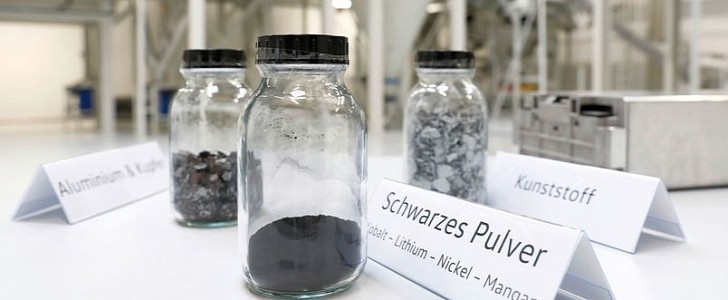Whenever electric vehicles are discussed, someone mentions the complex process of recycling their batteries once they have been used. Well, Volkswagen is proud to announce that a team of researchers from multiple companies, which were coordinated by the brand, has managed to recycle batteries multiple times, which is a first.
The goal of the program is to ensure that valuable materials, including rare metals, are recovered and reused. The first step was to find a way to recycle materials, while the second was to discover a solution to reuse those materials.
Once the two steps were completed, the research teams had to find a way to keep the cathode materials, graphite, and electrolyte permanently in a closed material cycle. The latter terms refer to continually using the materials described to make battery cells. The consortium's closed-loop raw material project is funded by the Federal Ministry for Economic Affairs and Climate Action in Germany.
Researchers involved in the project come from Taniobis GmbH, J. Schmalz GmbH, and Viscom AG. They continue to work with researchers from RWTH Aachen University, as well as TU Braunschweig, and the Fraunhofer Institute for Surface Engineering and Thin Films.
Researchers from all the mentioned establishments worked for three years under the leadership of the Volkswagen Group to reach this objective.
Now, there are processes that have been developed to ensure that it can be done, as well as the fact that it can be achieved predictably and repeatedly. The next step is to ensure scalability, as well as economic efficiency, and the loop will be closed for EV batteries once the process becomes an industry standard.
The project responsible for all this is called HVBatCycle, and its role was to find and establish an efficient process to maximize recycling and energy efficiency for batteries, while minimizing environmental impact.
The next step is to automate this process, at least in the dismantling phase, as well as the recovery phase. These two steps involved dismantling battery cells, recovering the materials used in them with minimal or even without loss of material, as well as investigating ways to make the process more effective.
For example, researchers are trying to determine if the separation of metal compounds is necessary to produce new, fully high-performance cathode material. All processes that are being developed are accompanied by an ecological and economic life cycle analysis, so researchers will find the best way for all parties concerned.
Once the two steps were completed, the research teams had to find a way to keep the cathode materials, graphite, and electrolyte permanently in a closed material cycle. The latter terms refer to continually using the materials described to make battery cells. The consortium's closed-loop raw material project is funded by the Federal Ministry for Economic Affairs and Climate Action in Germany.
Researchers involved in the project come from Taniobis GmbH, J. Schmalz GmbH, and Viscom AG. They continue to work with researchers from RWTH Aachen University, as well as TU Braunschweig, and the Fraunhofer Institute for Surface Engineering and Thin Films.
Researchers from all the mentioned establishments worked for three years under the leadership of the Volkswagen Group to reach this objective.
Now, there are processes that have been developed to ensure that it can be done, as well as the fact that it can be achieved predictably and repeatedly. The next step is to ensure scalability, as well as economic efficiency, and the loop will be closed for EV batteries once the process becomes an industry standard.
The project responsible for all this is called HVBatCycle, and its role was to find and establish an efficient process to maximize recycling and energy efficiency for batteries, while minimizing environmental impact.
The next step is to automate this process, at least in the dismantling phase, as well as the recovery phase. These two steps involved dismantling battery cells, recovering the materials used in them with minimal or even without loss of material, as well as investigating ways to make the process more effective.
For example, researchers are trying to determine if the separation of metal compounds is necessary to produce new, fully high-performance cathode material. All processes that are being developed are accompanied by an ecological and economic life cycle analysis, so researchers will find the best way for all parties concerned.




















